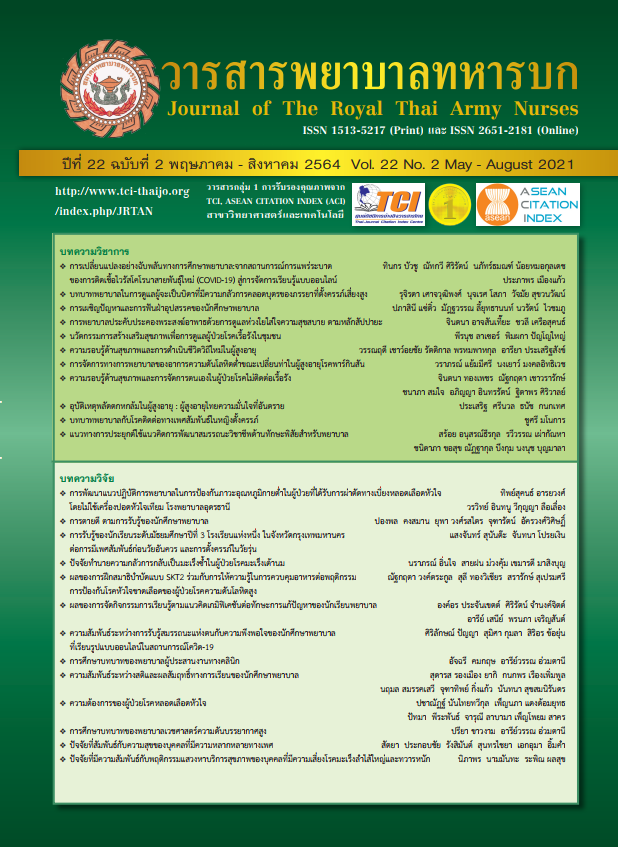The Effect of Organizing Learning Activities Based on Gamification Concept toward Problem Solving Skills of Nursing Students
Abstract
This quasi-experimental research applied the gamification concept in education. The concept is the integration of gaming with learning technology. Leading to classroom engagement and practice of problem-solving skills from situations in the game. Therefore, we are interested in using the game “Solve the outbreak” to organize learning activities based on the concept of gamification. So that the learner was an epidemic investigator in various epidemic situations. The aims of this research were to 1) analyze and compare the problem-solving skills of nursing students before and after providing the learning activities with the gamification approach and 2) study the students’ opinions towards the learning activities with the gamification approach. One group, pretest-posttest design was carried out on a sample of 63 second-year nursing students. The samples planned themselves to play “Solve the outbreak” game effectively within 4 weeks. The research instruments were the problem-solving skills test and the opinion survey. Reliability test using the Kuder-Richardson 20 are 0.82. The data were analyzed by using descriptive statistics and paired t-test.
The results found that problem-solving skills increased after participating in the learning activities based on the concept of gamification with statistically significant at .05 level. Student’s opinions show that they learned about diseases and outbreaks management in an enjoyable and engaging way. The scenarios stimulated their problem-solving thinking to save lives.
Downloads
References
Yamnoon S. The new era of teaching and learning management in higher education. Proceedings of the operational conference on learning outcome, educational measurement and evaluation; 2012 June 21; Chiangmai, Thailand: Bangkok. 2012; 3-5. (in Thai)
Jongmuenwai B, Kongsrima K, Prachai S, Jabjone S, Suikraduang A. Gamification for Learning. Journal of Project in Computer Science and Information Technology. 2018; 4(2): 34-43. (in Thai)
Perryer C, Scott-ladd B, Leighton C. Gamification: Implications for workplace intrinsic motivation in the 21. Asian Forum on Business Education Journal. 2012; 5(3). 371-381.
Mc Grath N, Bayerlein L. Engaging online students through the gamification of learning materials: The present and the future. In 30th ascilite conference 2013 Proceedings. Macquarie University, Sydney. 2013; 573-77.
Phuwipadawathi S. Learner centeredness & authentic assessment. 3rded. Chiangmai: The knowledge Center; 2011. (in Thai)
Kim et al. The role of problem-solving ability on innovative behavior and opportunity recognition in university students. Journal of Open Innovation: Technology, Market, and Complexity. 2018; 4:4 DOI 10.1186/s40852- 018-0085-4.
Centers for Disease Control and Prevention. Solve the outbreak, Atlanta, GA; 2013.
Thaweecharoenkij W, Suratreungchai V. The development of instruction model to promote the problem-solving skill thinking of vocational students based on theory of constructionism. Ratchaphruek Journal. 2019; 17(1): 86-93. (in Thai)
Fabricatore C, López X. Using gameplay patterns to gamify learning experiences. In The European Conference on Games Based Learning. Academic Conferences & Publishing International; 2014.
Prajankett O. et al. The effect of cooperative learning using jigsaw on community health nursing process toward 21st century learning skills and community health nursing competency of nursing students. Journal of The Royal Thai Army Nurses. 2018; 19(3): 165-174. (in Thai)
Laisakul P. Gamification: change the world to game. Digital media animation 2014; 6. (in Thai)
Khowtrakul S. Education psychology. Bangkok: Chulalongkorn University Printing House; 2013. (in Thai)
Sariwat L. Psychology for teacher. Bangkok: Odeon Store press. 2014. (in Thai)
Dicheva, et al. Gamification in education: A systematic mapping study. Educational Technology & Society. 2015; 18(3): 75-88.
Chokpon P. The Enhancement cooperative behavior by using gamification approach for Matthayomsueksa 4 enrichment sciences students classroom of Phadungnaree school. (thesis). Mahasarakham: Rajaphat Mahasarakham University; 2015. (in Thai)
Dubickis M, Gaile-Sarkane E. Transfer of know-how based on learning outcomes for development of open innovation. Journal of Open Innovation: Technology, market, and complexity. 2017; 3(1): 4
Hayton C, Cholakova M. The role of affect in the creation and intentional pursuit of entrepreneurial ideas. Entrepreneurship Theory and Practice. 2012; 36(1): 41-68
Downloads
Published
How to Cite
Issue
Section
License
บทความหรือข้อคิดเห็นใดใดที่ปรากฏในวารสารพยาบาลทหารบกเป็นวรรณกรรมของผู้เขียน ซึ่งบรรณาธิการหรือสมาคมพยาบาลทหารบก ไม่จำเป็นต้องเห็นด้วย
บทความที่ได้รับการตีพิมพ์เป็นลิขสิทธิ์ของวารสารพยาบาลทหารบก
The ideas and opinions expressed in the Journal of The Royal Thai Army Nurses are those of the authors and not necessarily those
of the editor or Royal Thai Army Nurses Association.






